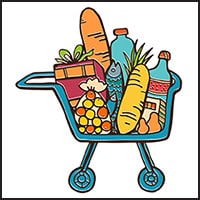Judaism Values

Sharing Jewish Values With Your Family
The Jewish Federation of Greater Washington’s Department of Jewish Life and Learning and PJ Library in Greater Washington offer a series of Judaism Values cards to complement family programs. These cards add a quick family education moment to a variety of PJ Library programs by tying in a Jewish value to a fun family experience at an event.
We share this information with you to offer insight into what Judaism values, while recognizing that people of various background and religions share the same values.
We hope that you will be able to use this information to spark conversations and actions in your family, circle of friends and/or classrooms. Feel free to download, print and distribute the PDFs of the cards. And let us know what you think or how you used them by emailing us!
Judaism Values cards are available for the topics listed below. To read about the values and to obtain downloadable pdfs for the cards, click on the desired topic below. PDFs should be printed with 2-sided printing and cut into four cards.
- Providing Peaceful Shelter: Sukkat Shalom
- Providing Food for All: Hazan et Hakol
- Caring for the Environment: Shomrei Adama
- Being Present: Hineni
- Protecting Your Health: Beriyut
- Inclusion: Beyachad
- Taking Care of Yourself: V’ahavta L’reikhah Kamocha
- Being Sensitive to Animals’ Needs: Tza’ar Ba’alei Chayim
- Appreciating Life’s Many Flavors: Ta’am Hachayim
We share this information with you to offer insight into what Judaism values, while recognizing that people of various background and religions share the same values.
We hope that you will be able to use this information to spark conversations and actions in your family, circle of friends and/or classrooms. Feel free to download, print and distribute the PDFs of the cards. PDFs should be printed with 2-sided printing and cut into four cards. And let us know what you think or how you used them by emailing us!
 |
Judaism Values Providing Peaceful Shelter
|
All people have a need for shelter to promote peace, safety, privacy, modesty, stability and wholeness. We must actively look out for others, and we honor G-d when we honor others.
“Share your bread with the hungry, and take the poor into your home; when you see the naked, clothe him and do not ignore your own kin.”—Isaiah 58:7
Application: The celebration of Sukkot gives us an annual reminder to appreciate permanent shelter following 40 years wandering. We can help others find permanent homes and a safety net by supporting shelters. We must also give protection from domestic violence. We can “pay it forward” through hospitality, hachnasat orchim.
The value of hospitality, hachnasat orchim, became a practical way to help the temporarily homeless.
How can we act to provide shelter and protection from violence?
What physical projects and which legal projects can help more people gain access to stable housing?
:: Download the PDF for this card ::
Learn More:
• Purim Advice for Parents: Encouraging Kind Acts from the PJ Library Blog
• Honoring Guests: Teach Your Child to Be a Gracious Host to Play Dates and Visitors from Kveller
• Shalom Sesame: Avigail & Brosh Explain Hachnasat Orchim
• Shalom Sesame: Abraham and the Three Visitors
Book Recommendations:
• Discover Hachnasat Orchim in PJ Library Books
 |
Judaism Values Providing Food for AllHazan et Hakol |
“Providing food for all” is a value linked to deeds of kindness (hessed) by feeding the hungry and the value of justice (tzedek) when we help give people access to nutritious food. In the grace after meals, we demonstrate gratitude by recognizing G-d as “Hazan et hakol,” the Provider of food for all. We aspire to that divine image by becoming G-d’s partners and providing/distributing food to those in need.
“The well-off are but divine instruments for alleviating human suffering.”—Rabbi Ismar Schorsch
Our possessions are not really ours—they are gifts from G-d. We should show gratitude by paying it forward to others. We share our blessings by providing for those who are hungry.
Application: Volunteer in a soup kitchen; work at a food bank or community pantry; add supplies to donate to your shopping list; glean in local fields and orchards. Focus on the dignity of the recipient rather than on the donor.
How can your family help the hungry while preserving their dignity?
There is enough food in the world; the issue is fair distribution. How can we make a more just system of food production/distribution?
:: Download the PDF for this card ::
Learn More:
• Giving to the Needy: A Purim Mitzvah from the PJ Library Blog
• Nurturing Gratitude from the PJ Library Blog
• Shalom Sesame: Helping Those in Need
Book Recommendations:
 |
Judaism Values Caring for the EnvironmentShomrei Adama |
We are partners with the Creator when we preserve the earth and ensure the health of the ecosystem. Greenfaith.org offers a literal notion of tikkun olam: the fixing of the physical world is in our hands.
When G-d created the first human beings, G-d led them around the Garden of Eden and said: “Look at my works! See how beautiful they are—how excellent! For your sake I created them all. See to it that you do not spoil and destroy My world; for if you do, there will be no one else to repair it.”
—Midrash Kohelet Rabbah, 1 on Ecclesiastes 7:13
Application: Rather than the notion that animals and the earth have “rights,” Judaism focuses on human beings as having responsibilities, including bal tashchit, not wasting resources in nature, even in wartime.
We have an ethical imperative not to waste natural resources, and we are asked to pause, recite a blessing and appreciate the beauty and bounty of creation.
Generate a list of ways to cut down on waste at home and at work. Create new blessings to show gratitude and appreciation of G-d’s gifts in nature and when and where they may be recited.
:: Download the PDF for this card ::
Learn More:
• Shemirat Ha’adamah (Protecting the Earth) on PJ Library
• Celebrate Earth Day with PJ Library Books from the PJ Library Blog
Book Recommendations:
• Earth Day and PJ Books
• Shemirat Ha’adamah-Related PJ Library Books
 |
Judaism Values Being PresentHineni |
We live up to our potential when we answer the call to serve with a willingness to be “present” and when we are concerned with people’s need for personal growth, human comfort and human interaction.
Vayomer: “Moshe, Moshe.” Vayomer: “Hineni!” God called to Moses, and he responded with “I am present and ready to serve!”
—Exodus 3:4
In Exodus and Deuteronomy, the Torah asks us to be vigilant towards the needs of others. “Lo tuchal lehitaleim. You must not remain indifferent!”
—Deuteronomy 22:3
Application: Being there for people could include the practice of bikur cholim (visiting the sick) and nichum avaylim (comforting the mourner). Being present to respond to a need is a divine attribute; we must transcend human tendencies of hiding our eyes and being indifferent and instead step up and rise to the occasion with action (example: Queen Esther).
We know that, when visited, the sick thrive and those that grieve find comfort. How can you set aside time to visit those in need of comfort and support?
:: Download the PDF for this card ::
Learn More:
• Raising a Mensch from the PJ Library Blog
• Raising a Mensch: Teaching Your Child to Simply Be a Good Person from Kveller
• How to Teach Tzedakah to Children: One Step at a Time
• Teaching Children the Mitzvah of Bikur Cholim (Visiting the Sick)
Book Recommendations:
• Bikur Cholim (Visiting the Sick) Books from PJ Library
 |
Judaism Values Protecting Your HealthBeriyut |
Second only to the toast “L’chayim!” (“to Life!”), is the phrase “Lab’riyut” (“to health,” as in Gezundheit or “Bless You”) wished for family and friends. After a sneeze, we wish for health in our lives.
“…and you shall protect your health; Ush’martem et Nafshotaichem”—Deuteronomy 4.15
We have an obligation to protect the general health of oneself and one’s society.—Maimonides, rabbi, philosopher & physician
Exercise “religiously” to keep fit. If we are created “in the image of God,” then when we honor our bodies we honor the Divine.
Milwaukee Rabbi Francis Barry Silberg once held the world record for continuously jumping rope. He jumped 35,000 times in four hours and 10 minutes.
Jump for JOY! Jump on the health bandwagon! JUST JUMP!
How can you add more physical activity to your day or week?
How can family and friends encourage each other to be physically fit?
:: Download the PDF for this card ::
Learn More:
• Commandments for the Belly from the PJ Library Blog
• The 10 Commandments of Healthy Eating for Parents
Book Recommendations:
• Books About Being Active from PJ Library
|
|
Judaism Values InclusionB’yachad |
Inclusion programs benefit all children. Fully including children with disabilities into play, both physically and socially, improves all children’s social and communication skills and self-esteem. It also helps children increase their comfort level with differences, acceptance of and respect for others.
Inclusion at Camp JCC: Funded by a generous grant from the National Inclusion Project, the JCCGW has implemented “Let’s ALL Play”—a model for inclusion in recreational settings—into Camp JCC’s pioneering inclusion program, giving children with disabilities a typical summer camp experience with their friends and siblings. The result is an award-winning inclusionary camp experience like no other.
Hinei ma tov u’ma na’im shevet achim gam yachad.
“How good it is, and pleasant, when all people live, work, play together.” —Psalm 133
What can your family do that encourages inclusive play opportunities?
In what ways can your sports team show acceptance and respect and welcome people with differences?
:: Download the PDF for this card ::
Learn More:
• Jewish Disability Awareness Month
• Jewish Disability Awareness Month and PJ Library
Book Recommendations:
• Books About Respecting Differences (Adam Yehidi Nivrah) from PJ Library
 |
Judaism Values Taking Care of YourselfV’ahavta L’reikhah Kamocha |
If we are asked to “love our neighbors as ourselves” (v’ahavta l’reikhah kamocha) we must first learn to love ourselves. Self-respect includes self-care.
Rabbi Hillel said, “We are created in God’s image—b’tzelem Elohim. Therefore, by keeping our bodies clean, we show respect for God.”
He also asked, “If I am not for myself, who will be for me?…”
We are all created in God’s image, which means that we are meant to respect ourselves, one of God’s creations, as a way of respecting God. That includes the way we talk about ourselves and the way we treat our bodies.
A typical example is that of the oxygen masks on airplanes—the flight attendants ask that adults put the mask on themselves before helping others. If we do not take care of our basic needs first, we will not be physically able to help others. In this example, the adult could lose consciousness if they do not put on their oxygen mask right away, thereby endangering both the child and adult.
How would you explain to your children about the connection of self-respect and self-care?
In what ways do you set an example for your children to love yourself?
:: Download the PDF for this card ::
Learn more:
• Healthy eating for parents
Book suggestions:
• Sam and Charlie (and Sam, Too!) from PJ Library
• “Hillel Takes a Bath,” from It’s Too Crowded in Here! And Other Jewish Folktales
 |
Judaism Values Being Sensitive to Animals’ NeedsTza’ar Ba’alei Chayim |
We can be G-d’s partners in creation by showing compassion for ALL creations. The phrase “tza’ar ba’alei chayim” is the strict prohibition from causing unnecessary pain to animals.
Showing responsibility with animals was considered training for leadership. Moses and David carefully tended flocks, and Rebekah made sure to give water to travelers’ camels.
In Deuteronomy 11:15, the Torah says that G-d provided grass for the animals and only then relates that humans “will eat and be satisfied.” The lesson adopted from this is that before sitting down to a meal, one must first see that the domestic animals are fed.
How may you show compassion for animals? How can you make sure their needs are met before you meet your own? Some examples could be birdfeeders in winter, walking your dog on time, putting out fresh water on hot days and being careful with pesticides and ice-melters.
Some people take the biblical Noah story as a challenge for us today. If we see the entire earth as an ark, how can we preserve the amazing diversity of animal life?
:: Download the PDF for this card ::
Learn More:
• Judaism and the Ethical Treatment of Animals from the PJ Library Blog
• Nurturing Compassion for Animals from the PJ Library Blog
Book Recommendations:
• Respect for Animals in PJ Library Books
• Children’s Books about Noah from PJ Library
 |
Judaism Values Appreciating Life’s Many FlavorsTa’am Hachayim
|
G-d made the physical world for us to enjoy. The Talmud says that when a person faces their Creator at the end of their days, they will be asked, “Did you taste all the fruits of my creation?”
Ta’am Hachayim is an Israeli phrase meaning “taste of life,” signifying the pleasure to be had in enjoying different foods. Kashrut (kosher) as an eating ethic can also promote mindful and healthy eating. Talk as a family about nutritious shopping and menu planning.
Application:
“Try it…you’ll like it!” Parents can model opportunities to taste new things and talk about smell, texture, color and the diversity of food. Choose a new fruit or vegetable to feature at a family meal.
One way to slow down and be more mindful of how and what you eat is to pause before eating and give thanks for what you will enjoy. The Shehecheyanu blessing thanks G-d “for sustaining us in life to reach moments of ‘firsts’ and to appreciate new experiences.”
Baruch atah Adonai Eloheinu melekh ha’olam she-hecheyanu ve’key’eh’manu ve’higiy’anu lazman ha-zeh.
As a family, discuss ways of showing appreciation to farmers, harvesters, packagers and all who are involved in bringing good food to your table.
:: Download the PDF for this card ::
Learn More:
- The Jewish Food Experience can help bring fun and a world of tastes to everything from yogurt to challah.
- Strategies to help picky eaters expand their tastes
- Pointers for planning nutritious meals (as well as a healthy life style)
- You can pause before eating to say blessing (berakha) that voices gratitude to the Creator for a world of smells and tastes from natural sources
Book Recommendations:
Discover in PJ Library Books: Trying Something New
And Estie the Mensch, the only PJ Library book that features ice cream!

